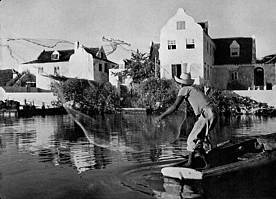
Fishing & Fish Farming

| The limitations of fishery in a relatively shallow sea, like the Caribbean surrounding us, seem obvious. Still, people keep getting fooled by the fabulously coloured fish they can see in those clear waters while scuba-diving or even snorkeling. The fact of the matter is, conditions here preclude any large sustainable fishery. |
You find these places in the southern hemisphere to the west of the African and South American continents.
Well, conditions are not like that at all here. While there are many fish around, stocks are all too easily depleted. By now, 90% of large fish have disappeared all over the world anyway.
Many efforts have been made in the past to stimulate professional fishing around here. Most successful still are local fishermen who go out in rather primitive conditions, using small boats for short trips and selling their catch on the market.
There are some larger boats (looks like mainly from Venezuela) that still operate on a rather modest scale. Without knowing too much about it, it seems to me their catch is mostly sold on the "Floating Market" De Ruyterkade in Willemstad. May well be they sell to supermarkets and restaurants as well.
Other, really larger boats, like from Korea and Japan, do operate in the Caribbean but not around here. There is an operating facility in St. Maarten (about 900kms away) where processed tuna arrives deep-frozen to be sent on. The Curaçao population has just grown much too large for the potential catch and much more fish is imported than produced locally.
Another real problem is hygiene. Local fishermen just dump their catch in the bottom of their vessels; most don't even have a cooling box aboard (except for beer, of course), let alone a refrigerator.
This is a fine old tradition; the photograph by Fred Fischer below was taken at the Rifwater in downtown Willemstad, a veritable open sewer that was filled in not so many years after he took the picture, in the 1950s.

On hot windless days you can still smell the poop stench
emanating from the ground there.
Not to mention small problems like the tourist "industry" doing away with mangroves (fish nurseries) and killing off the coral reefs. Not only with beach sand replenishments; human overpopulation may be just as bad, or even worse.
Aquafarming
It looks at first sight that the saliñas [inland salt waters] offer good opportunities for aquaculture. However, a second look shows there are two problems: There is no tide movement to refresh them; and they are very shallow indeed and may well be suited for cultivation of brine shrimp only. For this, you'd probably have to import feed. Providing feed from fish caught around the island will deplete those stocks even more, which would go for other forms of fish farming as well.
Apart from that, fish farms tend to pollute coastal waters and elsewhere have led to destruction of mangrove (fish nursery) stands. You'd have to go for vegetarian fish like catfish, tilapia or filter feeders like scallops, mussels and oysters. Even then, you'd have to provide feed somehow, and the most economic way might be to cause artificial tides or circulating water through the lagoons; both by giant pump systems. Who knows what havoc that could create.
It seems of very little use to invest in expanding fishery - a doomed effort.
And the same goes for

SEARCH this site or the Web

copyright notice
all material on this site, except where noted
copyright © by , curaçao
reproduction in any form for any purpose is prohibited
without prior consent in writing